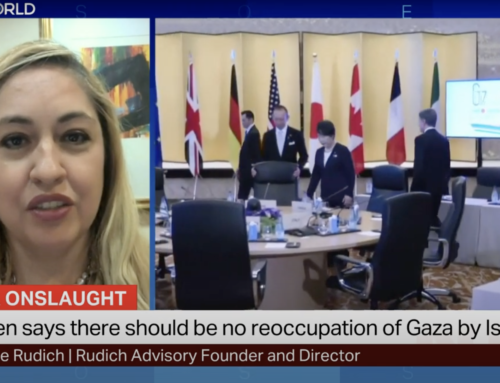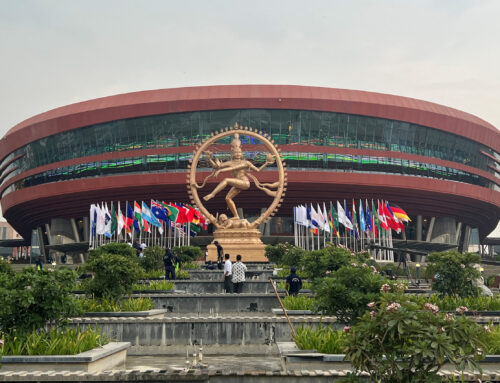From Ghost Town to Action: G20 at Hangzhou Renews Calls to Fight Illicit Finance
The G20 Summit of the leaders of the world’s largest economies held in Hangzhou, China, was a summit like no other.
The Chinese government created a ghost town by spending $1.5 billion to clear Hangzhou of its two million residents and strongly discouraged civil society protests. President Obama, who was attending his last G20 summit, was asked to alight from the tail end of Air Force One, perceived by many as a diplomatic snub, and there were clashes between Chinese security and the diplomatic corps and security teams of other G20 countries. 2016 has also been a year like no other.
The G20 leaders had a full agenda, with news headlines in the first half of the year dominated by Brexit, almost daily terrorist attacks across the world, the Panama Papers and the refugee crisis, with an estimated 65 million people displaced worldwide. It is a time of uncertainty and instability.
Unsurprisingly, illicit finance featured prominently in the G20 Summit Communique, in which the G20 leaders renewed calls to fight criminal finance which flourishes in the face of uncertainty. They also addressed traditional issues such as money laundering, terrorist financing, and tax transparency, and committed to initiatives in the areas of financial inclusion, de-risking, and corruption.
As the premier forum for international economic cooperation, the G20 acts as the driving force behind regulatory change in the financial crime prevention industry. For that reason, it is essential that financial crime and money laundering reporting officers are aware of what is happening at G20 summits and how international initiatives affect their operating environments.
Anti-money laundering law
In the area of anti-money laundering (AML), the G20 called on members to “intensify their support for domestic capacity building” to ensure countries were complying with international AML/CTF standards. It is likely that this will result in more countries amending local laws and regulations to improve regulatory oversight. The focus is on implementation of the Financial Action Task Force (FATF) Standards.
With the Fourth EU Money Laundering Directive expected to come into force in the final quarter of 2016, countries in Europe will need to have domestic laws in place to improve regulatory oversight, including the ability to issue higher fines for compliance failures. These laws will also require financial institutions and designated parties to implement enhanced measures and to have a better understanding of the risks posed by emerging value transfer technologies, specifically virtual currency platforms and wallets, as well as enhanced due diligence measures on higher-risk countries and transactions.
The issue of fraudulent trade mis-invoicing also appeared on the political statement issued by the G20. This includes over-invoicing, under-invoicing, over-shipping, under-shipping or the use of ghost cargos to transfer value. At Hangzhou, leaders indicated that they would continue to address cross-border financial flows sourced from criminal activities and that they would cooperate with the World Customs Organisation to draft a study in trade mis-invoicing. For banks and financial institutions that offer trade finance products, it is essential that existing systems and controls are reviewed to ensure that they address this risk.
For example, financial institutions should ensure product due diligence is carried out on transactions that touch higher-risk countries, involve connected parties, or deal in goods where the market price cannot be checked easily.
Given the complex nature of trade financing deals and the volume of documentation involved, specialized trade finance staff should ensure that their training is sufficiently up to date to enable them to detect red flags and other unusual activity.
Continuous monitoring should be carried out throughout the lifecycle of higher-risk trade finance transactions and, where necessary, the cargo should be verified independently to ensure that the documentation reflects what is being imported/exported.
Financial inclusion
With regard to financial inclusion, the leaders endorsed the G20 High-Level Principles for Digital Financial Inclusion, which recognize the role that digital financial services play in giving two billion adults access to financial services. This means that digital financial firms which target not only the domestic market but also financially excluded persons in developing countries will need to access the formal financial sector.
Companies should develop a risk appetite statement to determine whether they will accept digital financial services businesses as customers, how to treat this emerging sector, what due diligence measures they require to be carried out and what type of enhanced monitoring would be required for this unique emerging business type that services higher-risk individuals.
De-risking
De-risking, the perceived practice of banks ending or limiting business relationships with higher-risk categories of customers, was first addressed by the G20 at the Antalya Summit in 2015.
This year, the leaders pledged that they would “continue to address, through the FSB-coordinated action plan, the decline in correspondent banking services”, which is seen as essential in supporting remittances, trade, openness and financial inclusion.
The good news for financial institutions trying to balance the profit received versus the compliance cost of doing correspondent banking business is that the G20 has indicated that regulatory expectations will be clarified.
This will include a review of the FATF’s guidance on correspondent banking. That said, given the costs of maintaining these relationships and the high money laundering, terrorist financing, reputational and legal risks faced by financial institutions engaging in the correspondent banking business, the G20 and other international governance bodies will need to look how to incentivize financial institutions to maintain these relationships.
Terrorism
Terrorism and terrorist financing was a priority at the summit. The G20 vowed to “tackle all sources, techniques and channels” of terrorist financing, specifically listing the ways in which ISIL has been financing its operations. The leaders agreed to continue working on effective exchange of information, freezing terrorist assets, criminalizing terrorist financing and implementing the UN Al Qaeda and Daesh Sanctions programme (UNSCR 2253).
The leaders further called on the FATF to determine how it could strengthen its capacity and that of its international network in the fight against terrorist financing. All designated businesses must ensure that their staffs are adequately trained to detect terrorist financing, particularly as related to ransom payments and donations to charities whose funds may inadvertently end up in geographical areas controlled by terrorist groups.
Financial crime officers should seek confirmation that automated or manual sanctions screening is being carried out against UNSCR 2253 in addition to any local terrorist lists issued by national governments.
Escalation processes should be maintained up-to-date to ensure that any suspected terrorist financing is quickly investigated and reported to the proper authorities and financial institutions should have a policy in place stating that, where there is a suspicion of terrorist financing, it is fine to reject the payment unless advised to process the payment by the local financial intelligence unit (FIU).
Any clients suspected of providing terrorist funds should be subject to enhanced continuous transaction monitoring, screening and enhanced due diligence or should be exited following consultation with legal colleagues and the local FIU.
Tax transparency and tax crimes
Tax transparency received significant attention due to the disclosure of the Panama Papers and the EU ruling calling on Apple to pay the Irish government 13 billion euros due to anti-competitive behavior.
The leaders echoed their commitment to the implementation of automatic exchange of information by 2018, requiring the implementation of Foreign Account Tax Compliance Act (FATCA)-like compliance measures which were aligned to account opening and due diligence procedures by many financial institutions.
The G20 endorsed a proposal for the Organisation for Economic Cooperation and Development (OECD) to identify noncooperative jurisdictions with respect to tax transparency, which countries indicated would be subject to defensive measures. When these countries are announced, these should be added to the list of higher-risk countries used as part of the various AML risk assessments carried out by designated businesses.
The G20 countries further called for the “effective implementation” of transparency standards, particularly transparency of beneficial owners which was cited as essential to protecting the integrity of the financial system and to prevent the misuse of legal persons and arrangements for corruption, tax evasion, terrorist financing, and money laundering.
The G20 also requested that the FATF and the Global Forum on Transparency draft proposals to improve the implementation of international standards on transparency, including beneficial ownership transparency, and making it available to be exchanged on an international basis.
Financial institutions in countries where there is no requirement to verify the identity of ultimate beneficial owners or those that have only been identifying but not verifying beneficial ownership information for complex corporate structures in line with local laws should reassess resourcing requirements.
This is to ensure that there is adequate staffing to allow for a greater volume of data gathered as part of the onboarding process and potential sanctions and politically exposed person (PEP) matches identified as part of continuous screening. Backoffice systems should also be reviewed to ensure that there is adequate space to collect this data in a standardized format that can be subject to PEP and sanctions screening.
Corruption
In the area of corruption, recognizing the adverse impact of corruption and illicit finance on the integrity of the international financial system and the rule of law, the G20 agreed to a series of high-level, supra-national commitments in the Leaders’ Communique to enhance international cooperation, information sharing and asset repatriation to tackle corruption, while fully respecting the sovereignty of each country.
These are aimed at the countries themselves at the moment but initiatives drafted by the G20 Anti-Corruption Working Group will at some point filter down to the private sector. It is therefore essential that corporates have strong anti-bribery and compliance programmes in place as well as adequate risk-based PEP screening and continuous transaction monitoring to assist in the identification of any unusual activity in PEP accounts that could be indicative of corruption.
Much work remains to be done in the area of illicit finance at an international level. It will be interesting to see how these international initiatives made at the Hangzhou summit unfold. Financial institutions and other designated businesses must nevertheless ensure that they stay on top of the game if they are to be able adequately to manage their financial risks in line with regulatory expectations.
13 September 2016
Originally published on Thomson Reuters Accelus
Download “G20Hangzhou 13Sep2016.pdf”
G20Hangzhou_13Sep2016.pdf – Downloaded 888 times – 85 KB




